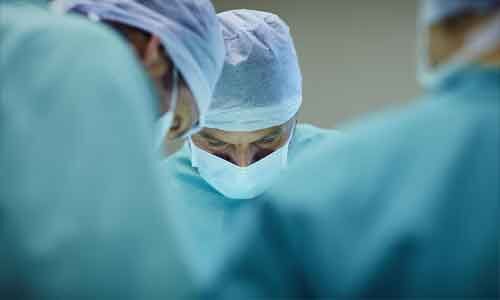- Home
- Medical news & Guidelines
- Anesthesiology
- Cardiology and CTVS
- Critical Care
- Dentistry
- Dermatology
- Diabetes and Endocrinology
- ENT
- Gastroenterology
- Medicine
- Nephrology
- Neurology
- Obstretics-Gynaecology
- Oncology
- Ophthalmology
- Orthopaedics
- Pediatrics-Neonatology
- Psychiatry
- Pulmonology
- Radiology
- Surgery
- Urology
- Laboratory Medicine
- Diet
- Nursing
- Paramedical
- Physiotherapy
- Health news
- Fact Check
- Bone Health Fact Check
- Brain Health Fact Check
- Cancer Related Fact Check
- Child Care Fact Check
- Dental and oral health fact check
- Diabetes and metabolic health fact check
- Diet and Nutrition Fact Check
- Eye and ENT Care Fact Check
- Fitness fact check
- Gut health fact check
- Heart health fact check
- Kidney health fact check
- Medical education fact check
- Men's health fact check
- Respiratory fact check
- Skin and hair care fact check
- Vaccine and Immunization fact check
- Women's health fact check
- AYUSH
- State News
- Andaman and Nicobar Islands
- Andhra Pradesh
- Arunachal Pradesh
- Assam
- Bihar
- Chandigarh
- Chattisgarh
- Dadra and Nagar Haveli
- Daman and Diu
- Delhi
- Goa
- Gujarat
- Haryana
- Himachal Pradesh
- Jammu & Kashmir
- Jharkhand
- Karnataka
- Kerala
- Ladakh
- Lakshadweep
- Madhya Pradesh
- Maharashtra
- Manipur
- Meghalaya
- Mizoram
- Nagaland
- Odisha
- Puducherry
- Punjab
- Rajasthan
- Sikkim
- Tamil Nadu
- Telangana
- Tripura
- Uttar Pradesh
- Uttrakhand
- West Bengal
- Medical Education
- Industry
Topical lidocaine holds potential for pain management after cardiac surgery: Study

USA: Topical lidocaine could be used for postoperative pain management following cardiac surgery and may aid in recovery, finds a recent study in the Journal of Cardiothoracic Surgery.
Compared to other surgeries, cardiac surgery is associated with considerable pain and there is ongoing research aimed at optimizing postoperative pain management. Effective acute postoperative pain management is important as greater acute pain severity during the postoperative period may lead to the development of chronic postoperative pain.
Lidocaine is one of the most widely used local anesthetics with well-known pharmacological properties. W. Michael Hooten, Mayo Clinic, Rochester, MN, USA, and colleagues aimed to investigate the effects of lidocaine on postoperative pain scores and recovery after cardiac surgery in the systematic review.
For this purpose, the researchers conducted a comprehensive database search by a reference librarian for randomized clinical trials (RCT) from January 1, 1980 to September 1, 2019. It included randomized controlled trials of lidocaine for postoperative pain management in adults undergoing cardiac surgery. After removal of duplicates, 947 records were screened for eligibility and 3 RCTs met inclusion criteria.
Sources of bias were identified in 2 of 3 RCTs. Lidocaine was administered intravenously, topically, and intrapleurally.
Key findings of the study include:
· 2% lidocaine placed topically on chest tube prior to intraoperative insertion was associated with significantly lower pain scores and lower cumulative doses of fentanyl; and 2% lidocaine administered intrapleurally was associated with significantly lower pain scores and significant improvements in pulmonary mechanics.
· Lidocaine infusions were not associated with significant changes in pain scores or measures of recovery.
· No significant associations were observed between lidocaine and overall mortality, hospital length of stay or ICU length of stay.
· No data were reported for postoperative nausea and vomiting or arrhythmias.
"Due to the favorable risk profile of topical lidocaine and the need for further advancements in the postoperative care of adults after cardiac surgery, topically administered lidocaine could be considered for incorporation into established postoperative recovery protocols," wrote the authors.
Reference:
The study titled, "Lidocaine for postoperative pain after cardiac surgery: a systematic review," is published in the Journal of Cardiothoracic Surgery.
DOI: https://cardiothoracicsurgery.biomedcentral.com/articles/10.1186/s13019-021-01549-0
Dr Kamal Kant Kohli-MBBS, DTCD- a chest specialist with more than 30 years of practice and a flair for writing clinical articles, Dr Kamal Kant Kohli joined Medical Dialogues as a Chief Editor of Medical News. Besides writing articles, as an editor, he proofreads and verifies all the medical content published on Medical Dialogues including those coming from journals, studies,medical conferences,guidelines etc. Email: drkohli@medicaldialogues.in. Contact no. 011-43720751


